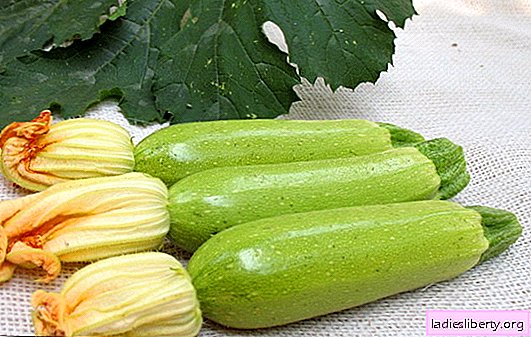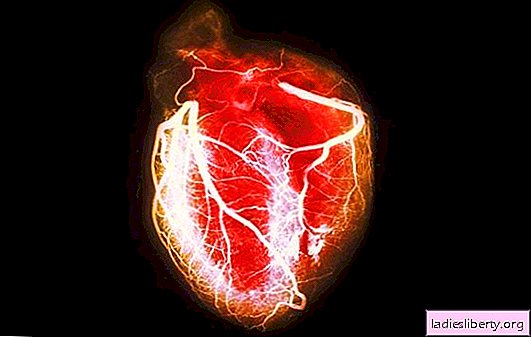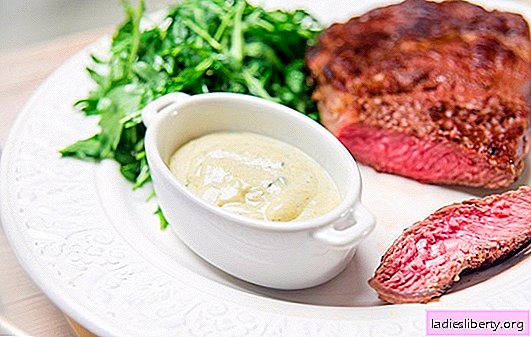
The benefits of zucchini consists not only in their pleasant and delicate taste, which we are used to feel in soups or stews, or as a side dish, but zucchini is used and in traditional medicine.
So, zucchini is useful in the form of poultices with scratches, as a balm for rheumatism, to improve blood circulation and lower cholesterol, as well as for many other diseases.
The harm of zucchini with proper use is not proven, so they are even prescribed to infants as the first complementary foods.
As a food source zucchini provide a very high concentration of nutrients, their benefits for the body, we describe below.
Squashes: composition, calorie content, as used
Squashes are a family of pumpkin, and, from the point of view of botany, it is considered a berry. But in cooking and in the people it is called a vegetable. Belonging to the type of pumpkin ordinary, zucchini amaze with its fertility and variety of varieties. From early spring to late autumn, delicious zucchini is present in abundance on the shelves of markets and shops. Inventive hostesses invented many delicious recipes with zucchini, but not everyone thought about the benefits and nutritional value of this versatile vegetable.
Simultaneously with the feeling of satiation, the human body benefits from zucchini in the form of low calorie content (only 25 kcal). Exactly low calorie and fiber saturation makes zucchini useful for losing weight product.
The following is the amount of nutrients present in 100 grams of raw zucchini:
Protein: 0.6 g
Carbohydrate: 3.6 g
Fat: 0.3 g
Vitamin C: 11 mg
The benefits of zucchini is not in large quantities of vitamins in general, but in saturation with vitamin C and potassium, which increase immunity and regulate blood sugar levels and blood pressure.
Vitamin and mineral composition of zucchini and benefits for the body:
• Vitamin C, contained in zucchini in large quantities, helps with eye diseases, asthma, scurvy, bruising, inflammation.
• Folate, potassium, manganese and vitamin A contribute to the normal functioning of all systems of the human body.
• Vitamins B6 and riboflavin support the nervous system.
• Beta-carotene contained in the zucchini peel has antioxidant properties and helps protect cells from oxidative damage.
• Magnesium and phosphorus contribute to the formation and maintenance of bone density.
How to use zucchini in cooking
Squashes become useful when cooking some dishes, bringing some flavor to their taste.
Pasta. With a special shredder, you can make your own "kabarons" in a matter of minutes, you just need to remove the shredded transverse layers of zucchini. Cooked noodles from zucchini boil for a few minutes in water with garlic, cream, lemon zest and seasonings. Serve with meatballs.
Cakes and pastries. Squashes have beneficial properties even in bread and other baked goods.
Soups. Ideal for dinner - zucchini soup. It has a calming effect on the intestines, removing bloating and gas.
Garnish. Zucchini, baked with cheese, very tasty complement roasted meat or fish.
Salads. In most salads with oil dressing zucchini "look" perfect. To get zucchini ingredient salad, you need to cut it, fry in olive oil for 4 minutes, mix with three drops of vinegar, roasted bell pepper, pine nuts, cilantro and basil. The resulting dressing of zucchini with low calorie add to chopped lettuce and cottage cheese slices. Mix everything, and can even be used as a main course for lunch.
The use of color zucchini. Really, squash flowers fit for human consumption. Since they spoil quickly, they are not sold in stores, but if you have your own squash bushes in the garden, then by all means take advantage of this opportunity. Zucchini flowers are fried, stuffed, and even used in salads (excellent taste combined with avocado).
Squash does not need to be cleaned. Cutting off each end of the vegetable, you get ready for further cooking vegetable. Try not to boil the zucchini or cook them in large amounts of water, as they become viscous and lose their taste.
The only nuance of zucchini: unlike pumpkin, they can not be eaten raw. They contain chemicals that protect healthy zucchini from the pests, and give a bitter taste. To minimize the loss of useful substances, before eating zucchini blanch in boiling water.
Taste zucchini sweetish, a little herbal. The smaller zucchini grow, the tastier and denser their flesh is. In large zucchini a lot of seeds, they are full of water and turn out loose after cooking.
Zucchini need to choose, based on their size (they should be thin and about the same thickness over the entire length) and the condition of the skin (it should be smooth to the touch and glossy in appearance).
Store zucchini with the benefit to the body better in the refrigerator or in a cool dark place, but it is better to use immediately. After a few days the zucchini flesh becomes bitter.
Squashes: what are the benefits for the body?
The first zucchini useful for vegetarians and people who adhere to a healthy diet. The beneficial properties of zucchini allow such people to supply the body with a sufficient set of vitamins and minerals.
Improving the work of the stomach and intestines
Like other types of pumpkin, zucchini contains a large percentage of light fiber. It is fiber that has beneficial properties for improving peristalsis - facilitates the passage of food through the digestive tract and eliminates problems such as constipation, bloating, excessive gas formation, and other more serious gastrointestinal pathologies.
Heart muscle maintenance
Fiber in zucchini is also an important element in maintaining heart health, as it preserves the natural balance of cholesterol and eliminates "bad" cholesterol from the body's systems, which reduces the risk of atherosclerosis, strokes and heart attacks. In addition, vitamin C in zucchini is an important element in the creation of collagen, which is the fundamental building material of the whole body, including blood vessels, muscles and cells, so squash can moderately reduce blood pressure and prevent clogged arteries. One plate of zucchini contains about 33% of the daily intake of vitamin C.
Zucchini is very useful with a large amount of potassium - zucchini in one plate contains about 295 milligrams, or 8% of the recommended daily intake. According to the American Heart Association, potassium helps regulate blood pressure, as it reduces the harmful effects of sodium on the body. Reduced risk of stroke, and the likelihood of developing other cardiovascular diseases.
Cancer Prevention
Significant levels of carotene contained in zucchini, endows this vegetable with antioxidant properties. The latter prevent the negative effects of free radicals in the body, resulting in damage to healthy DNA and the transformation of healthy cells into cancer cells. Carotene in combination with ascorbic acid (vitamin C) in zucchini provides a double blow to the free radicals in the body.
Regular consumption of vegetables can help protect the body against colon cancer.
Preventing anemia and maintaining cognitive function
High levels of iron in zucchini lead to an increase in energy reserves and reduce the chances of developing anemia (iron deficiency). Symptoms of anemia include weakness, fatigue, cognitive impairment, muscle pain, and more serious side effects. Iron is a key component of red blood cells, and, if contained in sufficient amounts in the body, increases the oxygenation of the limbs of the body.
Prevention of osteoporosis
Although zucchini is not endowed with a wide range of minerals in its composition, they contain several key minerals for bone health, which contribute to optimal bone mineral density. This leads to the obligatory presence of zucchini in the diet of children (so that the bones are properly formed) and the elderly (for the prevention of osteoporosis or other bone diseases).
Weight normalization
Zucchini provides the body with dietary fiber (fiber), through which the body feels satiety, as well as a large supply of fluid and nutrients. As a result, you want to eat less often, and the calorie content of zucchini at the same time is very low.
Zucchini: what is the harm to health?
To the delight of zucchini lovers, it is safe to say that properly prepared zucchini is not harmful for the body. But there are a few nuances. First, the harm from zucchini will be if they are raw. It's all about the above chemicals squash from pests. Fatal outcome for a person is impossible, but puppies and kittens will have a hard time. Secondly, zucchini, however, like other vegetables and fruits, can be with GMOs. Scientists say that such products are potentially harmful to the body.
Squashes for children: useful or harmful
Children squash give from an early age. There will be no harm to children from zucchini: a hypoallergenic vegetable, nutritious, but low-calorie. Squashes are beneficial for children because of their mild action on the digestive tract, which makes it ideal for first feeding with babies.
Zucchini: harm or good for losing weight?
Not fried, without butter and mayonnaise, zucchini is a real find for losing weight and people who need dietary food. The calorie content of one plate of sliced zucchini is about 19 kcal. This is half as much as in the same amount of broccoli or Brussels sprouts. And let the zucchini not differ in such beneficial properties as most green vegetables, their undoubted advantage in the variety of dietary dishes that can be prepared from them.











